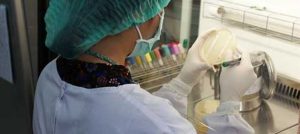ANTICOV Treatment Clinical Trial Crucial for Africa
 5 Januari 2021
5 Januari 2021

Only a united Africa can defeat COVID-19. Credit: WHO
By Sam Otieno
NAIROBI, Kenya, Jan 5 2021 (IPS)
The ANTICOV COVID-19 clinical trial, aimed at identifying treatments that prevent mild cases from progressing to severe forms of the disease, is crucial to Africa, researchers say. The trial will investigate home-based treatments to help prevent local health systems from being overwhelmed.
Borna Nyaoke-Anoke, Senior Clinical Project Manager & Medical Manager for DNDi, says that the studies target mild and moderate cases of COVID-19 and are important to Africa because lower-income countries remain under-represented in COVID-19 studies. The vast majority of COVID-19 clinical trials are being conducted in Europe, the US, and East Asia – testing treatments in contexts with considerable access to equipment and trained staff.
Launched late last year, the coalition comprises clinical experts, policymakers, and others from institutions such as ministries of health, universities, not-for-profit development research and development organisations, donor agencies and international organisations.
The ANTICOV trial will treat patients with mild to moderate symptoms through home-based care across Africa. This will prevent congestion of healthcare facilities with patients with mild symptoms who do not require respiratory support or critical care management.
He adds it will also prevent progression of mild to moderate disease-preventing healthcare facilities from being overwhelmed.
Nyaoke-Anoke says that while all eyes are on vaccines as the panacea, vaccines alone won’t be enough to stop the pandemic. Treatments are just as crucial, especially as they could prevent transmission to household contacts of infected patients required to self-isolate – something that may not be possible in many African communities.
“We hope that conducting these studies locally will facilitate prompt adoption of new evidence into medical treatment guidelines, enabling faster access to new medical tools and the trust of affected communities,” Nyaoke-Anoke tells IPS.
Nyaoke-Anoke says that the ANTICOV study will mobilise a collaboration of African and global science and public health leaders to respond to the urgent unmet medical needs on the continent. It will provide much-needed answers to enable countries in Africa and beyond to adopt effective therapeutic strategies adapted to resource-constrained settings.
“ANTICOV clinical trial, which is currently being rolled out in 13 African countries, will test multiple COVID-19 early treatment options identifying treatments adapted to Africa’s specific needs,” says Nyaoke-Anoke.
Hence, it will position the continent as a critical player in providing quality data on effective therapeutics, immunology, and epidemiology of mild to moderate COVID-19 disease, invaluable to the ongoing pandemic.
Babatunde Salako, director-general of the Nigerian Institute of Medical Research, welcomed the development. It provides an opportunity for Africans and African researchers to be part of this crucial trial, yielding specific information for African patients in terms of treatment and disease progression.
Salako, in an interview with IPS, says that it creates an opportunity for the continent to be involved in clinical trial targeted at African populations when they are often left out of such large trials. Experience in clinical trials would be enriched through participation with the opportunity to form new networks and collaborators.
“African researchers will be contributing data and scientific information for global decision making concerning COVID-19 and may provide an opportunity for the world to examine the peculiarity of Africa’s response to COVID-19 infection and control,” says Salako.
Benjamin Kagina, senior research officer at the Vaccines for Africa Initiative, University of Cape Town, South Africa, says the clinical trials were a great initiative. The clinical trial would generate locally relevant evidence that can be used together with other promising interventions, such as vaccines, to mitigate the pandemic’s negative impacts.
He explained that collaborations were critical in strengthening research capacity in Africa. More importantly, the trial will generate context-specific data that can inform practices and policies in Africa.
“It will enhance research collaboration and networking among African researchers. This will advance medical research in the continent that addresses the needs of Africans,” says Kagina.
The post ANTICOV Treatment Clinical Trial Crucial for Africa appeared first on Inter Press Service.
